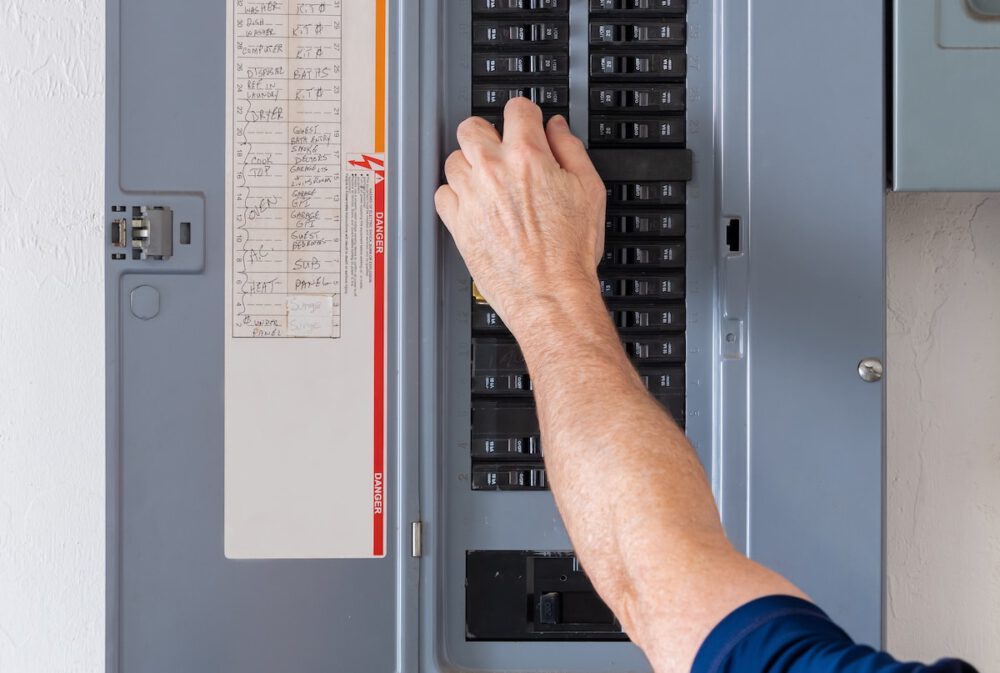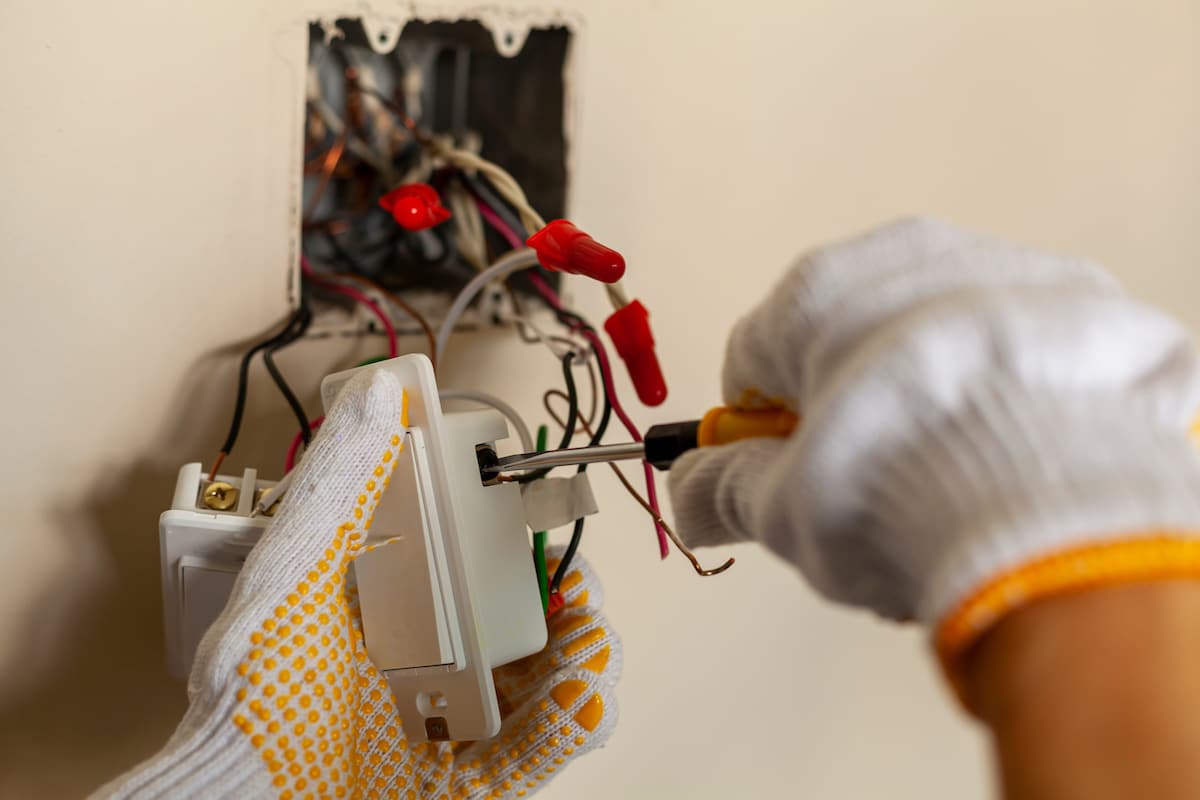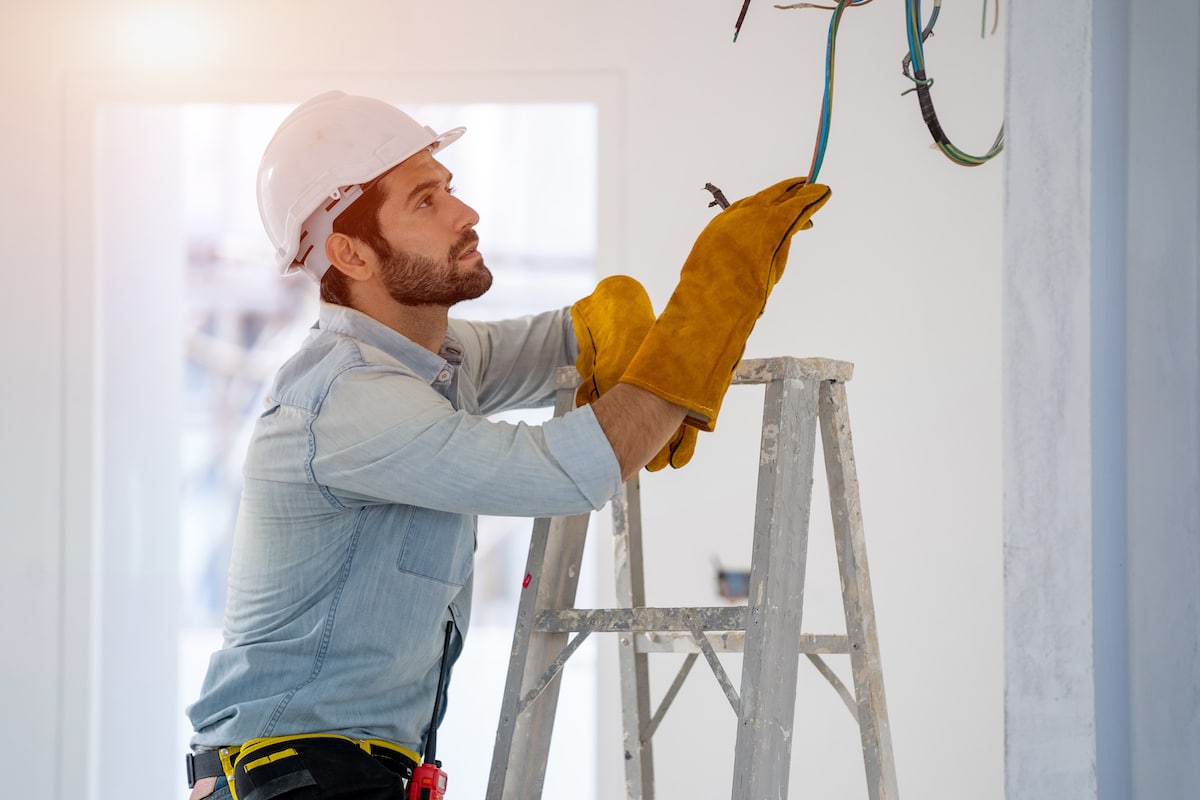Quick Contact!
For the fastest reply, call us at (678) 635-5429.
Mailing Address
1113 Ivey Brook Drive
Bethlehem, GA 30620
Monday – Friday: 8 am – 4 pm
Saturday & Sunday: Closed
Quick Contact!
For the fastest reply, call us at (678) 635-5429.

Electrical work is a fundamental aspect of home remodeling projects in Georgia, whether you’re upgrading fixtures, installing new appliances, or rewiring for improved functionality. While electrical projects can enhance your home’s comfort and efficiency, they also come with inherent risks if not approached with caution and knowledge.
As a trusted home remodeling service in Georgia, Georgia Home Remodeling understands the importance of prioritizing safety and ensuring that homeowners are equipped with essential tips and guidelines for electrical work.
In this blog, we’ll cover the intricacies of electrical work in Georgia, providing essential safety tips, outlining the dos and don’ts of DIY electrical projects, and explaining when we advise you to call the pros for electrical support.
Georgia has specific electrical codes and regulations that govern the installation, maintenance, and repair of electrical systems in residential properties. Familiarize yourself with these electrical codes to ensure compliance and mitigate the risk of safety hazards or legal consequences.
Certain electrical projects in Georgia may require permits from local authorities before work can commence. This includes:
Obtain the necessary permits and adhere to regulatory guidelines to ensure the safety and legality of your project.
While DIY enthusiasts may be tempted to tackle electrical projects themselves, it’s essential to recognize when professional expertise is warranted. Qualified electricians have the training, experience, and knowledge to safely and effectively handle complex electrical tasks, minimizing the risk of accidents or injuries.

Undertaking DIY electrical work can be a rewarding endeavor, but it also comes with inherent risks that must be carefully managed. Prioritizing safety is paramount to ensure the well-being of yourself, your family, and your property.
In this section, we’ll dive deeper into essential safety tips that every homeowner should follow when embarking on DIY electrical projects.
Before beginning any electrical work, always turn off the power to the circuit or area where you’ll be working. This can be done by switching off the circuit breaker or removing the fuse at the main electrical panel.
It’s essential to use a voltage tester to confirm that the power is indeed off before proceeding. Even if you’re working on a single outlet, it’s best to shut off power to the entire circuit to prevent accidental shocks.
Using the right tools and equipment is crucial for safety and efficiency when working with electricity. Ensure that you have insulated screwdrivers, wire cutters, pliers, and voltage testers specifically designed for electrical work.
Using improper tools or damaged equipment can increase the risk of accidents and injuries. Additionally, invest in a sturdy ladder or platform to safely reach high or awkward spaces without risking falls.
Before making any electrical connections, thoroughly inspect the wiring and terminals for signs of damage, wear, or corrosion.
Damaged wires or connections can lead to:
Replace any damaged components and ensure that connections are secure and properly tightened to prevent hazards.
It’s essential to be mindful of the electrical load on circuits and avoid overloading them with too many appliances or devices. Overloading circuits can lead to:
Distribute loads evenly across circuits and use surge protectors to safeguard sensitive electronics from power surges. If you frequently experience tripped breakers or flickering lights, it may be a sign of overloaded circuits that require professional attention.
Ensure that electrical outlets and appliances are properly grounded to prevent the risk of electric shocks or fires. Grounding provides a path for excess electrical current to safely dissipate, reducing the risk of electrical hazards.
Test outlets regularly for proper grounding using a ground fault circuit interrupter (GFCI) tester and replace any outlets that fail the test. If you’re unsure about the grounding status of your electrical system, consult a qualified electrician for inspection and remediation.
Maintain a clutter-free work area and avoid working in cramped or confined spaces where the risk of accidental contact with live wires is higher. Keep flammable materials away from heat sources and electrical equipment to minimize the risk of fire hazards. Additionally, ensure adequate ventilation in work areas to dissipate heat and prevent the buildup of fumes from soldering or insulation materials.
Wearing appropriate protective gear is essential for personal safety when working with electricity. For protection against electric shocks, burns, and injuries, use the following:
Avoid wearing loose clothing or jewelry that could become entangled in equipment or wiring. Additionally, tie back long hair to prevent it from getting caught in moving parts or exposed wires.
Before starting any DIY electrical project, carefully plan the scope of work, gather necessary materials and tools, and familiarize yourself with the relevant electrical codes and regulations.
If you’re unsure about any aspect of your electrical project, don’t hesitate to seek guidance from qualified electricians or home remodeling professionals. Consulting experts can help ensure that your project is completed safely and effectively.
Always test electrical circuits and components with a voltage tester before making any connections or adjustments. This helps prevent accidental shocks or injuries and ensures that the power is safely disconnected.
If you encounter any warning signs of electrical problems, such as flickering lights, sparking outlets, or burning smells, don’t ignore them. These could indicate serious electrical issues that require immediate attention from a professional electrician.
When it comes to electrical work, cutting corners or taking shortcuts can have serious consequences. Follow proper procedures, use quality materials, and prioritize safety at all times to avoid accidents or damage to your home.
While DIY projects can be rewarding, it’s essential to know your limits and recognize when a project is beyond your skill level. Electrical work, in particular, requires expertise and precision. Attempting complex tasks without proper training can lead to costly mistakes or safety hazards.

While DIY enthusiasts may be eager to tackle electrical projects themselves. However, there are certain scenarios where it’s best to trust the expertise of professionals.
Georgia Home Remodeling is committed to providing top-notch electrical services, and knowing when to call in the pros can save you time, money, and potential safety hazards.
If your electrical project involves complex installations, rewiring, or major upgrades to your home’s electrical system, it’s advisable to enlist the help of experienced professionals. Georgia Home Remodeling’s team of licensed electricians has the skills and expertise to handle even the most intricate electrical tasks with precision and efficiency.
Electrical work inherently carries risks, including electric shock, fire hazards, and damage to property. If you’re uncertain about the safety implications of your project or lack the necessary knowledge and training to ensure safe practices, it’s best to leave it to the professionals at Georgia Home Remodeling. Our electricians prioritize safety at every step of the process, minimizing risks and ensuring peace of mind for homeowners.
Compliance with electrical codes and regulations is essential to ensure the safety and legality of your electrical project. Georgia Home Remodeling’s team stays abreast of the latest codes and standards in Georgia, ensuring that all electrical work is performed in accordance with regulatory requirements. By entrusting your project to us, you can rest assured that it will meet or exceed industry standards.
DIY electrical projects can be time-consuming and labor-intensive, especially if you’re navigating unfamiliar territory. Georgia Home Remodeling’s professional electricians have the experience and efficiency to complete projects promptly and with minimal disruption to your daily routine. By outsourcing your electrical work to us, you can save time and focus on other aspects of your home remodeling project.
When you choose Georgia Home Remodeling for your electrical needs, you benefit from our warranty and guarantee on all workmanship. Our commitment to quality and customer satisfaction means that we stand behind our work, providing peace of mind and assurance that your electrical project is in good hands.
Electrical work is an integral component of home remodeling projects in Georgia, but it requires careful planning, adherence to safety guidelines, and sometimes, the expertise of qualified professionals.
By understanding essential safety tips, complying with electrical codes and regulations, and knowing when to seek professional assistance, homeowners can ensure that their electrical projects are completed safely and effectively.
Georgia Home Remodeling is committed to promoting safety and providing expert guidance for all your home remodeling needs, including electrical work. With the right knowledge and precautions, you can embark on electrical projects with confidence, knowing that your home and family are protected.
Reach out to us today to learn more about how we can help!
Georgia’s Home Renovation & Remodeling Specialists